In the strategy of SEO professionals, backlinks are very important, but often SEOs don’t understand the difference between backlinks and referring domains.
In this article, we will understand the difference between referring domains and backlinks, their importance, and how to balance them.
Referring Domains vs Backlinks: What is the Difference?
Here’s the difference between referring domains and backlinks:
- Referring domains refer to the number of unique domains or websites that give link to your website. A referring domain is a domain that contains at least one link to your website. Referring domains represent the number of unique websites that are linking to your website.
- Backlinks are the individual links that point to your website from other websites’ webpages. Each backlink represents a single link from one page to another, in this case, from a page on another website to a page on your website.
So, the main difference between referring domains and backlinks is that Referring domains are unique websites that link to your website, while backlinks are links from one webpage to another webpage or website.
These webpages can be from only one website (referring domain) as well.
One website (known as referring domain) can give you multiple backlinks from multiple webpages.
To improve your website’s authority and search engine rankings, you should focus on both referring domains and backlinks.
Somehow referring domains are considered more important to get long-term rankings and strong results.
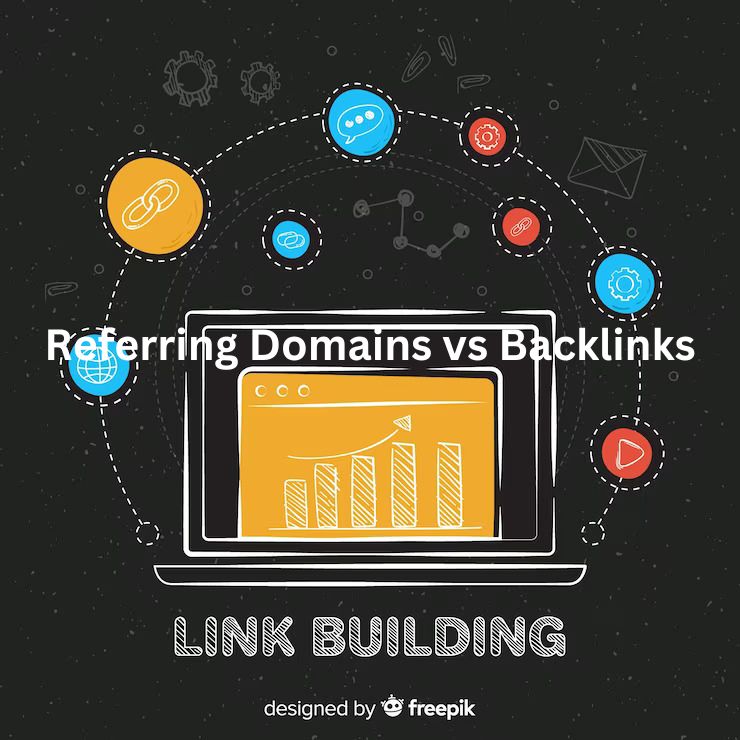
Referring Domains vs Backlinks explained with real-life example
Imagine your website is throwing a party and inviting guests (backlinks) to attend. Those guests will be known as backlinks.
Referring domains are like the number of different houses where these guests are coming from.
The more houses that guests come from, the more popular and well-known your party (website) appears.
Let’s see each in detail:
What is Referring Domains?
When a website (known as a referring domain) gives a backlink as a reference to your website in its content or image, it is called a referring domain.
If the same website gives more than one backlink to your website, then your website’s backlink profile will have only one referring domain because it received multiple links from the same domain.
So the domain from which you are taking backlinks is the referring domain for your website.

Why referring domains are important?
- The more unique referring domains you have, the more authoritative and trustworthy your website appears to search engines.
- Referring domains can provide insights into the quality and relevance of the backlinks pointing to your website.
- Monitoring your referring domains can help you identify potential issues with your backlink profile, such as spammy or low-quality links, which can negatively impact your website rankings in search engines.
- Analyzing your competitors’ referring domains can provide valuable insights into their SEO strategy and help you identify potential opportunities to improve your own SEO backlinks strategy.
- Having backlinks from high-quality referring domains can drive more traffic to your website, as visitors may follow those links to your site.
- A variety of referring domains helps build a strong backlink profile for your website. Multiple backlinks from one website can be seen as poor practice, so getting backlinks from different websites is crucial.
How to check referencing domains of a website?
To check the referring domains of a website in Ahrefs, follow these steps:
- Go to Ahrefs website and log in to your account.
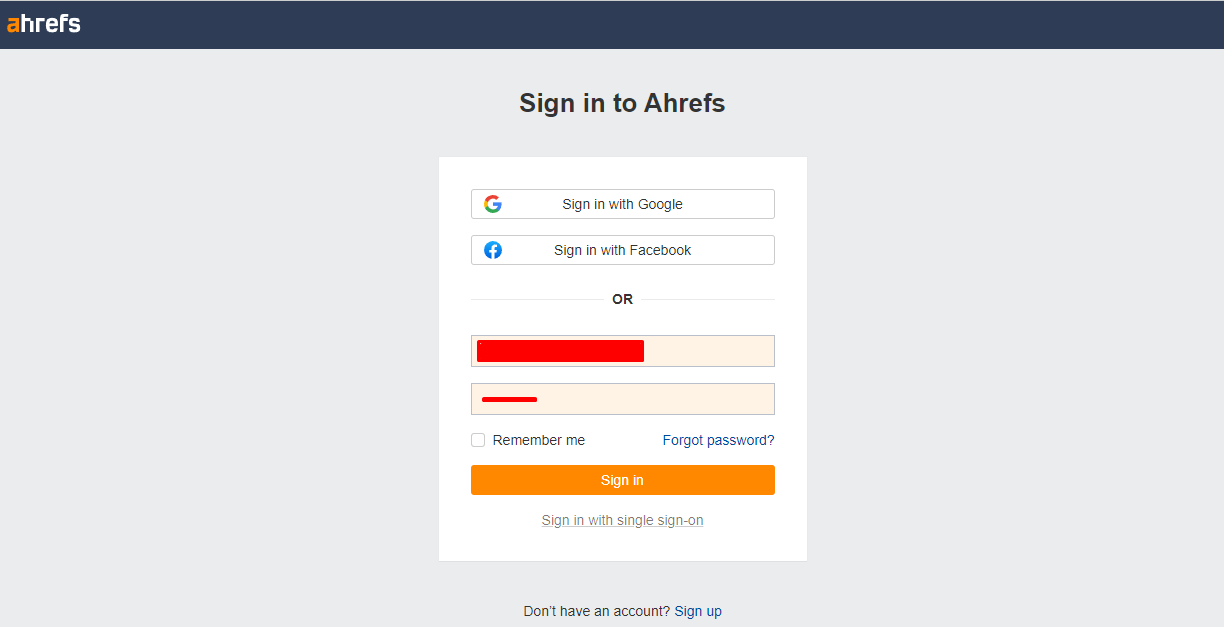
- Enter the website URL that you want to check in the search bar at the top of the page.
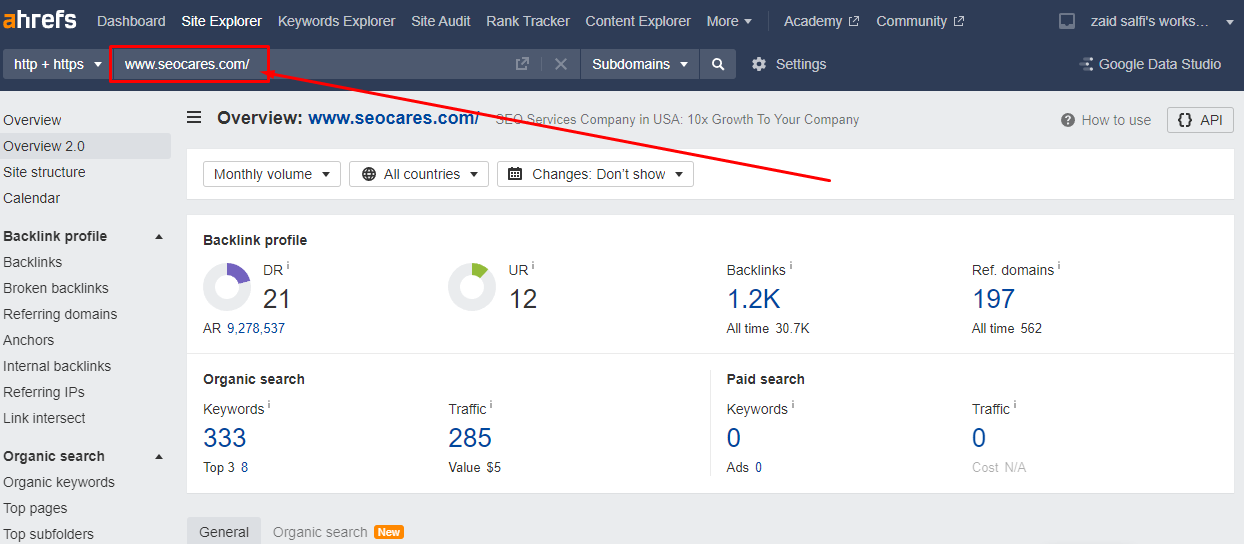
- Once the website’s profile appears, scroll down to the “Referring Domains” section.

- Here, you will see the number of referring domains and a list of websites that are linking to the website you searched for.
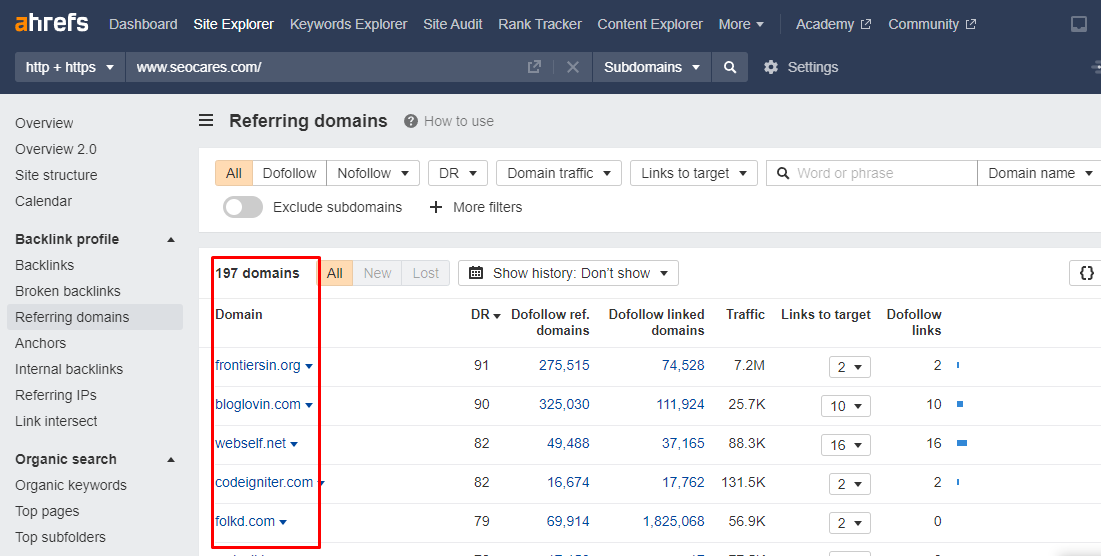
- You can also click on any referring domain website to view more details about each referring domain, including their authority score and the number of backlinks they have to the website you searched for.

What are Backlinks?
When a website creates a hyperlink to your website’s URL on its any specific page, it is called a backlink.
Backlinks are still an important ranking factor in 2023, but not every backlink provides benefits.
Only natural and worthy backlinks can help your website rank higher in search engine result pages.

Why Backlinks are important?
Backlinks are important for the following reasons:
- Backlinks signal to search engines that your website is reputable and valuable, which can lead to higher search engine rankings.
- Backlinks can bring visitors to your website from other websites that link to your content.
- Backlinks from authoritative websites can increase your brand’s visibility and credibility.
- If your website has more high-quality backlinks, then your brand is more likely to be seen as an authoritative source of information in its industry.
- Building backlinks requires outreach and networking with other websites, which can lead to valuable partnerships and collaborations.
How to check backlinks of a website using ahrefs?
To check the backlinks of a website using Ahrefs, you can follow these steps:
- Go to the Ahrefs website (www.ahrefs.com) in your browser and login your account.
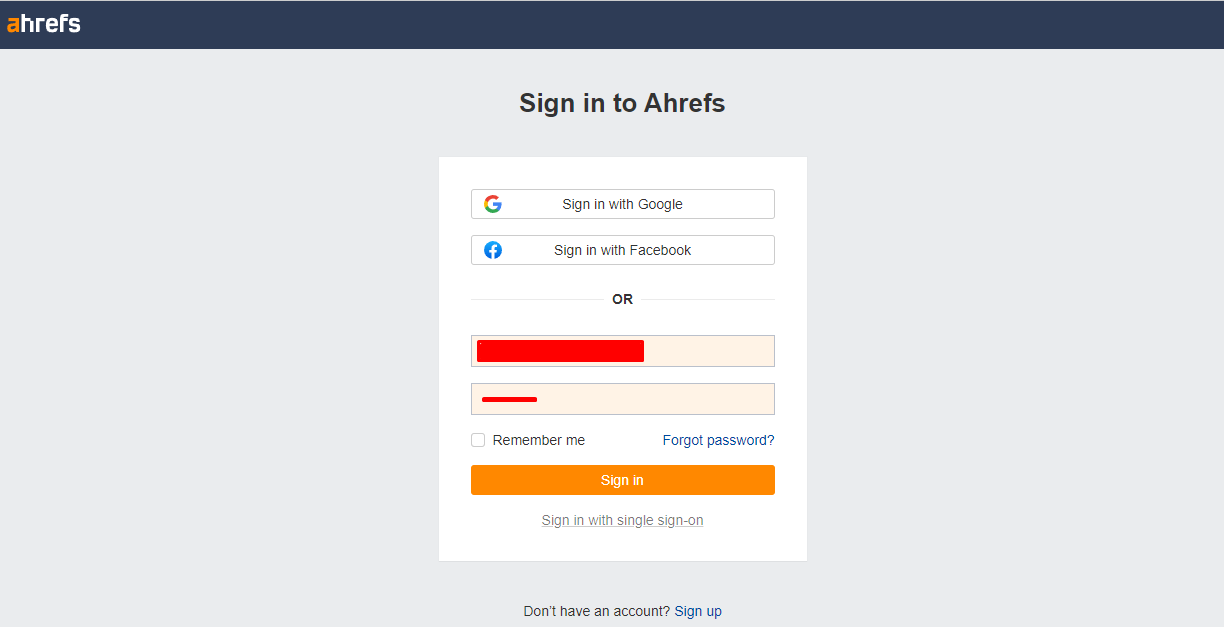
- You will see a search bar at the top of the ahrefs page. Enter the URL of the website you want to check backlinks for and click on the “Search” button.

- Ahrefs will show you an overview of the website’s backlink profile. To see more details, click on the “Backlinks” tab.
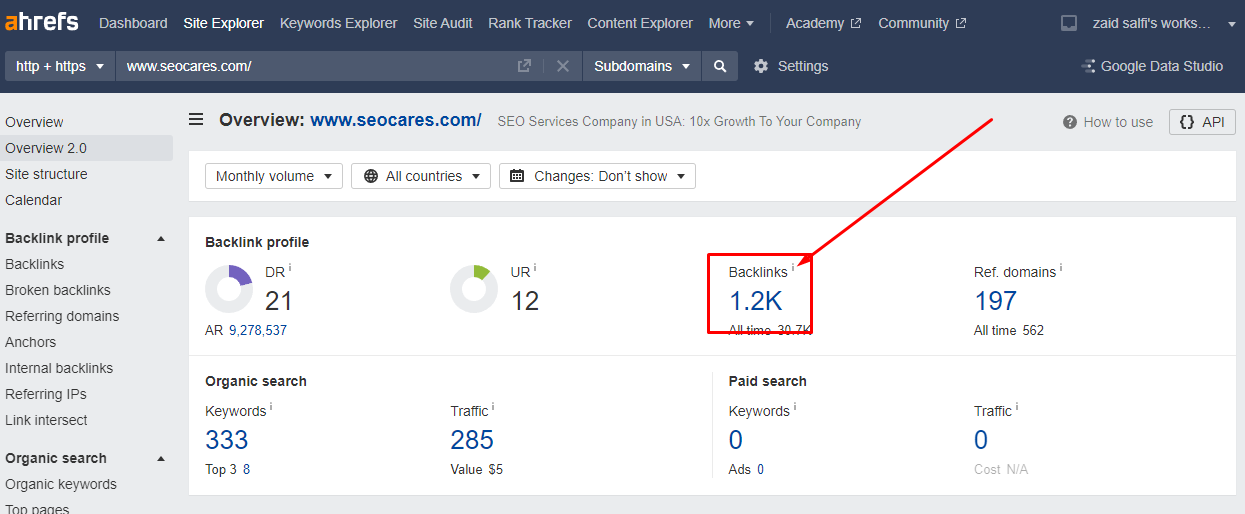
- In the Backlinks tab, you can see a list of all the websites that are linking to the website you’re analyzing. You can sort the list by various parameters, such as domain rating, URL rating, or the number of referring domains.

- You can also use the filters to refine your results by various criteria, such as language, country, or anchor text.

Common Myths about referring domains and backlinks
Myth 1. More backlinks and referring domains always lead to better rankings:
Having a diverse set of backlinks and referring domains can improve your website’s authority and trustworthiness, but it’s not the only factor that can help your website rank higher.
The quality and relevance of the referring domains, as well as the quality of the content on your website, also play a crucial role in determining your rankings.
Myth 2. All backlinks from referring domains are equal:
Not all backlinks from referring domains are equal in terms of value.
Backlinks from high-quality, relevant websites are more valuable than those from low-quality or irrelevant sites.
Myth 3. Referring domains and backlinks with high authority is always the best:
While getting backlinks from high-authority websites can be beneficial, it’s not always the best strategy.
It’s important to also focus on getting backlinks from relevant websites, as these are more likely to drive relevant traffic to your website.
Myth 4. Quantity is more important than quality:
The quantity of backlinks doesn’t matter at all.
Only the quality of backlinks matters for long-term rankings.
Having a large number of low-quality backlinks can actually harm your website’s rankings, as search engines can penalize websites having spammy and irrelevant backlink profiles.
How Referring Domains and Backlinks Impact SEO
Everyone knows that backlinks are still an important ranking factor for Google, but this is only half the story.
The full statement is that quality relevant backlinks are a ranking factor for Google.
When Google follows a link from a trusted website’s content to another website, it considers boosting the ranking of the linked website.
But, the link must be natural and helpful for the user.
If the link is dofollow, it is even better because Google can pass on the link juice to the linked website.
If there are multiple links to the same website on a single website, Google will not give that website more ranking or benefit.
But if a lot of websites have linked to the same website, then Google will give that website a ranking benefit.
This is because when someone adds a link to another website in their content, it sends a signal to Google that the linked website is credible and authentic.
Referring Domains vs Backlinks: What to focus on?
Whether you’re talking about backlinks or referring domains, you should always focus on quality.
A natural, relevant, and high-quality backlink can provide a lot of benefits to your website.
While both backlinks and referring domains are important, from an SEO standpoint, it’s better to focus more on referring domains.
Google prefers backlinks from multiple websites rather than multiple backlinks from a single website.
Frequently asked questions about Referring Domains and Backlinks
Are referring domains and backlinks the same?
No, referring domains and backlinks are not the same thing.
Referring domains are unique websites that contain at least one external link pointing to your website, whereas backlinks are individual links pointing to your website from other websites.
What are backlinks from referring domains?
Backlinks from referring domains are links that point to your website from a unique external website.
Having a diverse range of backlinks from referring domains is generally considered more important than having a large number of backlinks from a small number of referring domains.
What is the difference between the referrer and referring domain?
The referrer is the website that a visitor came from before landing on your website, while the referring domain is the website that links to your website.
The referrer is related to website traffic and analytics, whereas the referring domain is related to backlinks and SEO.
What is the Optimal Balance between Backlinks and Referring Domains?
There is no specific ratio of backlinks to referring domains that is universally recommended.
The ratio of backlinks and referring domains depend on the niche, competition, and type of business or website.
There is no any fixed rule for it.
Having a diverse range of high-quality backlinks from a variety of referring domains is more important than simply acquiring a high number of backlinks from a small number of referring domains.
Is refferal traffic a backlink?
No, referral traffic is not a backlink. When a user visits your website by clicking on your website URL on any external source, like as social media or other websites, that is called referral traffic.
If a website links back to your website in any specific page’s content, that is a backlink.
Whether or not any user follows that link doesn’t matter, it will still be considered a backlink.
How many backlinks do I need to build to get 1 domain authority?
When a new website is created and becomes available online, its Domain Authority (DA) is already at 1.
But there is no fixed number of backlinks required to gain 1 or more domain authority (DA) points.
Domain authority is calculated based on a variety of factors, including the quality and relevance of backlinks, referring domains, and many other factors.
It can be more challenging to increase your domain authority as it gets higher, and it may require a higher number of high-quality backlinks from diverse referring domains to make significant gains in DA.
How Long Do Backlinks Take To affect?
The length of time it takes for Google to acknowledge a backlink and its corresponding impact depends on the following factors.
- Quality and relevance of the backlinks
- How frequently do search engines crawl and index the websites
- Competitiveness of the keyword or niche you are targeting
What are some ways to build a diverse range of Referring Domains and Backlinks?
Some ways to build a diverse range of Referring Domains and Backlinks include:
- Creating high-quality content
- Guest blogging on other websites
- Participating in relevant online communities
- Social media sharing
- Building relationships with other website owners relevant to your industry
Can a website rank without backlinks?
Yes, it is possible for a website to rank without backlinks.
If a website’s content is relevant, of high quality, and extremely helpful for the users, then Google may rank that content even without backlinks after understanding the content and topic intent.
But gaining natural relevant backlinks makes it faster to rank in SERPs.


